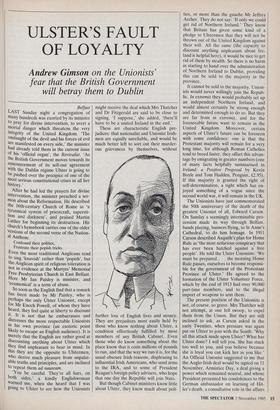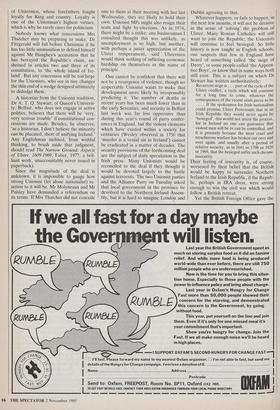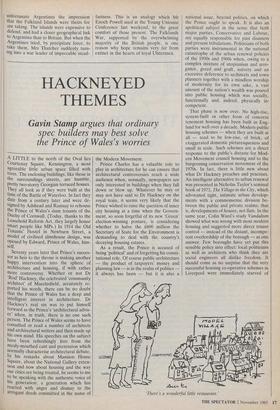ULSTER'S FAULT OF LOYALTY
Andrew Gimson on the Unionists' fear that the British Government will betray them to Dublin
Belfast LAST Sunday night a congregation of many hundreds was exorted by its minister to pray for divine intervention, to avert a mortal danger which threatens the very integrity of the United Kingdom. 'The onslaught of the devil and his forces of evil are manifested on every side,' the minister had already told them in the current issue of his 'official organ', the Revivalist. 'As the British Government moves towards its announcement of its sell-out agreement with the Dublin regime Ulster is going to be pushed over the precipice of one of the most serious constitutional crises in all her history.'
After he had led the prayers for divine intervention, the minister preached a ser- mon about the Reformation. He described the 16th-century Church of Rome as 'a tyrannical system of priestcraft, supersti- tion and darkness', and praised Martin Luther for beginning its destruction. His church's hymnbook carries one of the older versions of the second verse of the Nation- al Anthem:
Confound their politics, Frustrate their popish tricks.
Even the most traditional Anglicans tend to sing 'knavish' rather than 'popish', but the Anglican spirit of religious toleration is not in evidence at the Martyrs' Memorial Free Presbyterian Church in East Belfast. Here Mr Ian Paisley is minister, and ecumenical' is a term of abuse.
So soon as the English find that a remark has been made by Mr Paisley, who is perhaps the only Ulster Unionist, except for Mr Enoch Powell, of whom they have heard, they feel quite at liberty to discount it: It is not that he embarrasses and distresses the more respectable Unionists in his own province (an esoteric point likely to escape an English audience). It is merely that the English are rather good at discounting anything about Ulster which they find unpleasant to bear in mind. In this they are the opposite to Ulstermen, who derive much pleasure from unpalat- able truths and principles, and are inclined to repeat them ad nauseam.
You be careful. They're all liars, on both sides,' a kindly Englishwoman warned me, when she heard that I was going to Ulster to see how the Unionists might receive the deal which Mrs Thatcher and Dr Fitzgerald are said to be close to signing. suppose,' she added, 'there'll have to be a united Ireland in the end.'
These are characteristic English pre- judices: that nationalist and Unionist Irish- men are equally unreliable, and would be much better left to sort out their murder- ous grievances by themselves, without further loss of English lives and money. They are prejudices most easily held by those who know nothing about Ulster, a condition effortlessly fulfilled by most members of any British Cabinet. Even those who do know something about the place know that it costs millions of pounds to run, and that the way we run it is, for the usual obscure Irish reasons, displeasing to influential Irish Americans, who send arms to the IRA, and to some of President Reagan's foreign policy advisers, who hope that one day the Republic will join Nato.
But though Cabinet ministers know little about Ulster, they know much about poli- tics, or more than the gauche Mr Jeffrey Archer. They do not say: 'If only we could get rid of Northern Ireland.' They know that Britain has given some kind of a pledge to Ulstermen that they will not be thrown out of the United Kingdom against their will. All the same (the capacity to discount anything unpleasant about Ire- land is helpful here), it would be nice to get rid of them by stealth. So there is no harm in starting to hand over the administration of Northern Ireland to Dublin, providing this can be sold to the majority in the province.
It cannot be sold to the majority. Union- ists would never willingly join the Repub- lic. In extremis they would probably set up an independent Northern Ireland, and would almost certainly be strong enough and determined enough to do so. But they are far from in extremis, and for the foreseeable future want to remain in the United Kingdom. Moreover, certain aspects of Ulster's future can be foreseen with some confidence: one is that the Protestant majority will remain for a very long time, for although Roman Catholics tend to breed faster, they offset this advan- tage by emigrating in greater numbers (one of many facts helpfully summarised in Ireland: a Positive Proposal by Kevin Boyle and Tom Hadden, Penguin, £2.95). If this majority is granted the right of self-determination, a right which has en- joyed something of a vogue since the second world war, it will remain in the UK.
The Unionists have just commemorated the 50th anniversary of the death of the greatest Unionist of all, Edward Carson. On Sunday a seemingly interminable pro- cession made its way through Belfast, bands playing, banners flying, to St Anne's Cathedral, to do him homage. In 1911 Carson described Asquith's plan for Home Rule as 'the most nefarious conspiracy that has ever been hatched against a free people'. He told the Ulster Unionists: 'We must be prepared . . . the morning Home Rule passes, ourselves to become responsi- ble for the government of the Protestant Province of Ulster.' He agreed to the formation of the Ulster Volunteer Force, which by the end of 1913 had over 90,000 part-time members, and to the illegal import of weapons to arm them.
The present position of the Unionists is not, of course, so grave. Mrs Thatcher will not attempt, at one fell swoop, to expel them from the Union. But they are still inclined to ask, as Carson asked in the early Twenties, when pressure was again put on Ulster to join with the South: 'Why all this attack made upon Ulster? What has Ulster done? I will tell you. She has stuck too well to you, and you believe because she is loyal you can kick her as you like.' An Official Unionist suggested to me that the Anglo-Irish deal would be signed on 11 November, Armistice Day, a deal giving a power which remained neutral, and whose President presented his condolences to the German ambassador on learning of Hit- ler's death, a consultative role in the affairs of Ulstermen, whose forefathers fought loyally for King and country. Loyalty is one of the Ulsterman's highest virtues, which is why he rarely cares for politicians.
Nobody knows what concessions Mrs Thatcher may be preparing to make. Dr Fitzgerald will fall before Christmas if he has too little ammunition to defend himself against Mr Haughey's accusation that he has betrayed the Republic's claim, en- shrined in articles two and three of its constitution, to 'the whole island of Ire- land'. But any concession will be too large for the Unionists, who see in tiny changes the thin end of a wedge designed ultimately to dislodge them.
A historian from the Unionist tradition, Dr A. T. Q. Stewart, of Queen's Universi- ty, Belfast, who does not engage in active politics, believes that there will be 'very, very serious trouble' if constitutional con- cessions are made. Besides, he observes, `as a historian, I don't believe the minority can be placated, short of unifying Ireland.' Any Englishman inclined, from wishful thinking, to brush aside that judgment, should read The Narrow Ground: Aspects of Ulster, 1609-1969, Faber, 1977; a bril- liant work, unaccountably never issued in paperback).
Since the magnitude of the deal is unknown, it is impossible to gauge how strong Unionist (let alone nationalist) re- action to it will be. Mr Molyneaux and Mr Paisley have demanded a referendum on its terms. If Mrs Thatcher did not concede one to them at their meeting with her last Wednesday, they are likely to hold their own. Unionist MPs might also resign their seats and fight by-elections. As in 1974, there might be a strike: one businessman I consulted thought this was unlikely, as unemployment is so high, but another, with perhaps a juster appreciation of the Ulster temperament, said Ulstermen would think nothing of inflicting economic hardship on themselves in the name of principle.
One cannot be confident that there will not be a resurgence of violence, though no respectable Unionist wants to make that development more likely by irresponsibly predicting it. The number of deaths in recent years has been much lower than in the early Seventies, and security in Belfast last week was far less oppressive than during this year's round of party confer- ences in England, but the violent elements which have existed within a society for centuries (Wesley observed in 1750 that `murder is a venial sin in Ireland') cannot be eradicated in a matter of decades. The security provisions of the forthcoming deal are the subject of daily speculation in the Irish press. Many Unionists would be reconciled to the deal if they thought it would be devoted largely to the battle against terrorists. The two Unionist parties and the Alliance Party on Tuesday asked that local government in the province be devolved to the Northern Ireland Assem- bly, but it is hard to imagine London and Dublin agreeing to that.
Whatever happens, or fails to happen, in the next few months, it will not be decisive in the sense of 'solving' the problem of Ulster. Many Roman Catholics will still want to join the Republic; the Unionists will continue to feel besieged. So little history is now taught in English schools, one suspects that few in England have heard of something called 'the siege of Derry', or some people called 'the Appren- tice Boys', or know that in some ways both still exist. This is a subject on which Dr Stewart has written authoritatively:
Recurrent siege is . . . part of the cycle of the Ulster conflict, a cycle which will continue for a long time to come, whatever the consequences of the recent crisis prove to be . . . . If the spokesmen for Irish nationalism could promise Ulster Protestants that in an Irish Republic they would never again be `besieged', this would not arrest the process, for in Ireland no one can guarantee that violent men will be or can be controlled, and it is precisely because the most cruel and treacherous warfare has broken out over and over again, and usually after a period of relative security, as in 1641 or 1798 or 1920 or 1969, that the besieged suffer such chronic insecurity.
Their feeling of insecurity is, of course, worsened by their belief that the British would be happy to surrender Northern Ireland to the Irish Republic, if the Repub- lic, perhaps in IRA dress, were strong enough to win the civil war which would follow a British retreat.
Yet the British Foreign Office gave the unfortunate Argentines the impression that the Falkland Islands were theirs for are taking. The islands were expensive to defend, and had a closer geographical link to Argentina than to Britain. But when the Argentines tried, by precipitate force, to take them, Mrs Thatcher suddenly turn- ing into a war leader of impeccable stead- fastness. This is an analogy which Mr Enoch Powell used at the Young Unionist Conference last weekend, to the great comfort of those present. The Falklands War, supported by the overwhelming majority of the British people, is one reason why hope remains very far from extinct in the hearts of loyal Ulstermen.
























































 Previous page
Previous page